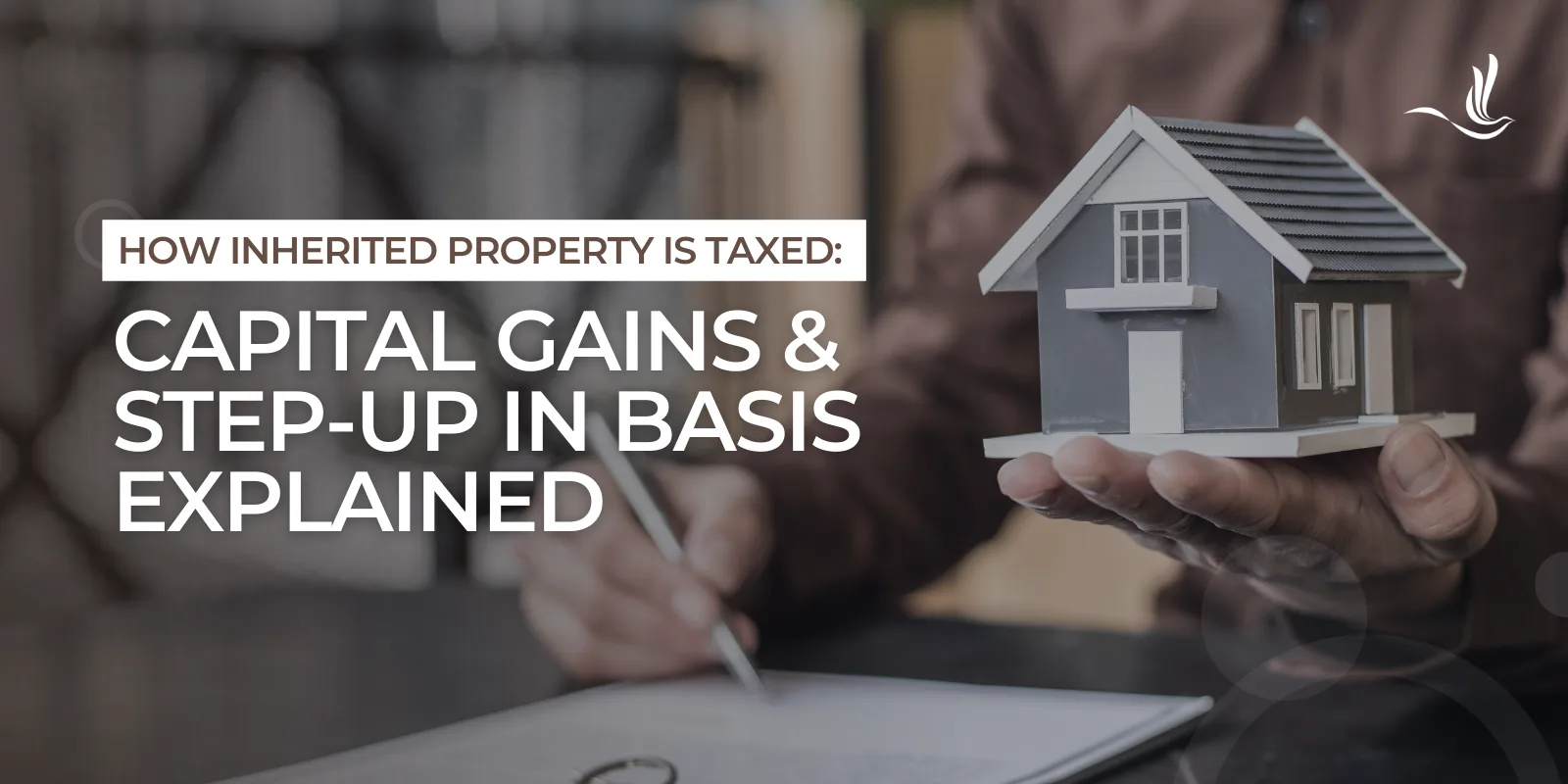Key Takeaways:
You don’t pay income tax when you inherit property, but you may owe capital gains tax if you sell it.
Inherited property gets a “step-up in basis” to its fair market value at the date of death, which can reduce or eliminate capital gains taxes.
Capital gains are only taxed when the property is sold, and always at long-term rates, even if sold immediately.
Selling soon after inheriting can minimize your tax bill, especially if the value hasn’t changed much.
Community property states may offer a double step-up in basis, reducing taxes even more for surviving spouses.
You can deduct selling costs like commissions and fees to further lower your taxable gain.
Inheriting property can be a financial reward, but it can also come with confusing tax implications. If you’ve recently inherited a home, land, or another piece of real estate, you may be wondering: How is inherited property taxed? The good news is that while you don’t pay income tax simply for inheriting, you might face taxes when you decide to sell. Understanding the capital gains tax and the step-up in basis rule can save you thousands and ensure you report everything correctly on your return. This article breaks down exactly how inherited property is taxed, when capital gains apply, how the step-up in basis works, and how to reduce your tax bill legally.
What Happens When You Inherit Property?
When someone passes away and leaves you property, whether through a will, trust, or probate, the property becomes yours. However, it’s important to understand that inheritance itself is not taxable as income under federal law.
You Don’t Pay Income Tax on Inheritance
Contrary to popular belief, the IRS does not consider inheritance to be taxable income. That means if you inherit a house worth $500,000, you do not owe tax just because the home came into your possession. However, what you do with the property after inheritance (sell it, rent it out, or live in it) can trigger tax consequences, especially if the property has appreciated in value since the original owner bought it.
Understanding Capital Gains on Inherited Property
Capital gains tax is one of the primary ways inherited property can be taxed, but only if you sell it.
What is Capital Gains Tax?
Capital gains tax is a tax on the profit from selling an asset like stocks, real estate, or personal property. It is calculated as:
Capital Gain = Sale Price – Adjusted Basis
When it comes to inherited property, the gain is based on how much the property has appreciated since the date of the decedent’s death, not when they originally purchased it.
Inherited Property and Long-Term Capital Gains
One favorable tax treatment is that inherited assets are always treated as long-term capital gains, even if you sell them immediately. This matters because long-term capital gains are taxed at lower rates than short-term gains. For 2025, long-term capital gains tax rates are:
What is a Step-Up in Basis?
The step-up in basis is arguably the single most important concept to understand when it comes to how inherited property is taxed.
Definition of Step-Up in Basis
When someone dies, the tax basis of the property is “stepped up” to its fair market value (FMV) as of the date of death. This rule drastically reduces the capital gains you might have to pay if you sell the inherited property. It can even eliminate them altogether.
In other words, when someone passes away and you inherit their property, the IRS lets you pretend you bought it for whatever it was worth on the day they died. For example, let’s say your parents bought a house 20 years ago for $100,000. If the house is worth $500,000 when you inherit it, you only owe taxes on any amount over $500,000 if you sell it. So, if you sell it for $510,000, you only pay taxes on the $10,000 profit, not the $410,000.
Why It Matters
Without the step-up, you’d be taxed on gains from the time your loved one purchased the property, possibly decades ago. The step-up resets the clock, allowing you to sell at or near the inherited value with little to no taxable gain.
How Capital Gains Are Taxed on Inherited Property
The capital gains tax only applies when you sell the inherited property. The gain is calculated based on the stepped-up basis.
Capital Gains Tax Rates
As noted earlier, inherited property is taxed at long-term capital gains rates, regardless of how long you hold it. This is a benefit because these rates are lower than short-term capital gains, which are taxed at your ordinary income rate.
What If the Property Appreciates After Inheritance?
If you hold on to the inherited property and it increases in value before you sell, you may owe tax on that new gain. For example, say you inherit a property valued at $500,000 and five years later, you sell it for $600,000. Your capital gain is $100,000, which may be subject to 0%, 15% or 20% tax, depending on your income.
Ways to Minimize Capital Gains Taxes
There are several legal strategies you can use to reduce or even eliminate capital gains taxes on inherited property.
1. Sell Soon After Inheriting
If you plan to sell, doing so shortly after inheriting allows you to take full advantage of the stepped-up basis. The market value won’t have had time to increase significantly, so the taxable gain is small or nonexistent.
2. Get a Professional Appraisal
The IRS expects you to have a reasonable basis for the property’s value at the time of death. An appraisal from a certified professional can protect you in case of an audit and ensure you’re using the correct value as your basis.
3. Offset Gains With Losses
If you’ve sold other investments at a loss, you can offset those losses against the gain on the inherited property to reduce your tax liability.
4. Consider a 1031 Exchange (for Investment Property)
If the inherited property was a rental or investment, a 1031 exchange allows you to defer capital gains taxes by reinvesting the proceeds into a similar property. Note that this doesn’t apply to primary residences.
Exceptions and Special Situations
Some situations can complicate the tax treatment of inherited property. Here’s what to look out for.
Property Held in a Trust
If you inherit property through a trust, the trust documents determine how and when you receive the property. The step-up in basis still generally applies, but you may need to consult with a trust attorney or tax advisor to ensure you understand your specific scenario.
Community Property States
Normally, when one spouse dies and leaves their half of a jointly owned property to the surviving spouse, only the deceased spouse’s half gets a step-up in basis to the current market value. In states like California or Texas, where community property rules apply, a surviving spouse may receive a double step-up in basis, on both their half and the deceased spouse’s half of the property. This can significantly reduce capital gains tax if the property is sold later.
For example, let’s say you and your spouse bought a house for $200,000. When your spouse dies, it’s worth $600,000. Shortly after their death, you sell the home for $620,000.
In a common law state, like Florida, your new basis would be $400,000. Half of your spouse’s is $300,000 ($600,000 divided by 2), plus your half of the original $100,000 basis ($200,000 divided by 2). So, you’d pay capital gains on $220,000. On the other hand, if you lived in a community property state, like California, your new basis is $600,000. You pay capital gains tax on $20,000 ($620,000 – $600,000).
Decline in Property Value
If the property’s value has declined since the original purchase, you may inherit it with a stepped-down basis. That means the FMV at the time of death is actually less than what the decedent paid. While this could reduce your tax benefit, it also might allow you to claim a capital loss if you sell for less than the stepped-down basis.
Reporting the Sale of Inherited Property on Your Tax Return
If you decide to sell the property, you must report it correctly on your federal tax return.
Use Form 8949 and Schedule D
Form 8949: Lists the details of the sale, including the stepped-up basis and the date of sale.
Schedule D: Summarizes all capital gains and losses.
You’ll also want to keep a copy of the appraisal or FMV documentation on file in case the IRS ever asks for it.
Include All Related Costs
You can add the costs of selling, such as real estate commissions, title fees, and closing costs, to the basis to reduce your taxable gain. Let’s say you inherited a home with a stepped-up basis of $500,000 and you sell the home for $550,000.
At first glance, it looks like you made a $50,000 gain, but you can deduct selling costs like:
Real estate agent commission (3% of $550,000): $16,500
Title and escrow fees: $3,000
Repairs and staging for sale: $2,000
This would bring your total selling costs to $21,500. You’d add that to your basis:
Adjusted basis = $500,000 + $21,500 = $521,500 Capital gain = $550,000 – $521,500 = $28,500
So instead of being taxed on $50,000, you’re only taxed on $28,500, a significant savings.
Frequently Asked Questions
Q: How do I reduce capital gains tax on an inherited property?
A: You can reduce capital gains tax by selling the property soon after inheritance, using the stepped-up basis, deducting selling expenses, or offsetting gains with capital losses. Getting a professional appraisal can also help accurately establish your basis.
Q: How does stepped-up basis work for inherited property?
A: A stepped-up basis means the property’s tax value resets to its fair market value on the date of the original owner’s death. This reduces or eliminates capital gains if you sell the property soon after inheriting it.
Q: What assets do not get a step-up in basis on property?
A: Assets like retirement accounts (e.g., IRAs, 401(k)s), annuities, and income-in-respect-of-a-decedent (IRD) items do not receive a step-up in basis. These are taxed differently and often as ordinary income.
Q: How do you determine the cost basis of an inherited property if there was no appraisal?
A: If there was no formal appraisal, you can estimate the property’s value at the date of death using comps from nearby home sales, tax assessments, or a retroactive appraisal.
Q: How to prove step-up in basis?
A: You prove a step-up in basis by documenting the fair market value of the property on the date of death, typically with a certified appraisal or reliable comparable sales data.
Tax Help for Those Who Inherited Property
Inheriting property isn’t a taxable event but selling that property can lead to capital gains tax, unless you understand and use the step-up in basis rule correctly. Fortunately, this rule often allows heirs to sell inherited real estate with little or no tax due. Understanding how inherited property is taxed ensures you preserve your inheritance and avoid costly mistakes. Whether you’re planning to sell, rent, or hold onto the property, being informed is your best financial defense. Optima Tax Relief is the nation’s leading tax resolution firm with over $3 billion in resolved tax liabilities.
If You Need Tax Help, Contact Us Today for a Free Consultation





























